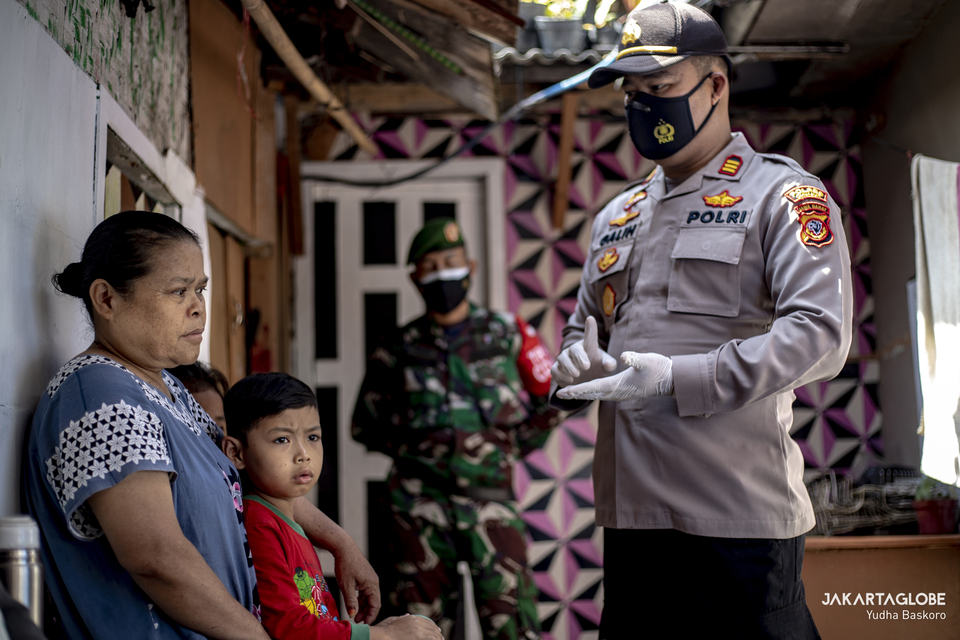Unfolding the “Social Distancing Saga”

With the introduction of the Delta variant of the SARS-Cov-2 virus to Indonesia in July 2021, the country’s newly gained reputation as the world’s Covid-19 “epicenter” may be seen as a testament to how effective the pandemic-responding policies implemented by the government have been. Among these policies is a string of social restriction measures, initially set as the large-scale social restrictions (PSBB) and morphed into variations of social restrictions degree, from micro-scaled, emergency-natured, to the newly announced Level 4 community activity restrictions (PPKM).
In response to the bombardment of these short-lived, seemingly analogous measures, memes arise throughout the Internet, mockingly clumping these policies as a never-ending saga of
social distancing efforts.
The saga-like nature of the pandemic-responding policies carried out per instruction of the law may not be a unique predicament in Indonesia. In fact, the recently promulgated 2020 Law about Job Creation, also known as the omnibus law, was designed as a groundbreaking solution to combat Indonesia’s red-tape problem: a legal system filled with overnumbered, redundant, and contradictory laws.
The “Social Distance Saga” may thus become a fitting specimen to unfold and observe when trying to have a bird-eye view on Indonesia’s overall legal system, to find out its effectiveness in addressing various social issues, and eventually understand how to establish a legal system that can ensure social welfare as enshrined in Indonesia’s very own 1945 Constitution.
The “Weapons” of Laws and Regulations
At the heart of most sagas lies a centerpiece in the form of a powerful weapon to either destroy or save the universe. Likewise, in each legal system, the law works in similar mechanics to carry out its function as a spearhead of justice: a “good” law will assertively regulate the society, and a “bad” law will, in turn, create chaos or anarchy. To fulfill its regulatory function effectively, the law must be useful, certain, and most importantly, just.
Since the start of the Covid-19 pandemic, the government has swiftly implemented various emergency regulations to instruct safeguarding measures in all affected fields, including the health, transportation, economic, and education sectors. Despite the purposed usefulness of these measures, many were met with skepticism and confusion by the citizens, primarily due to their redundant and contradictory nature.
The classic red-tape problem of Indonesia’s legal system is replicated in the country’s pandemic-responding measures. As can be found on the Covid-19 National Task Force website, there are a total of 13 policy regulations in the form of the Instructions of Ministry of Internal Affairs in halfway 2021 alone, regulating mainly about phases of social restrictions.
Other than social restriction-related measures, there are countless other laws and regulations scattered within the legal system that are ambiguous, superfluous, and contradictory. An example of this problem is the contradicting regulations regarding antigen rapid test requirement for travel, once issued by the Covid-19 National Task Force and Ministry of Transportation that differ in date of entry into force clause and eventually created loss suffered by traveling citizens.
A solution to such overregulation and the resulting haywire implementation is for the government to streamline and centralize the pandemic-responding causes as much as possible, with the authorized task force as the lead arranger. In this aspect, Singapore’s system of consolidating its pandemic-responding measures into a single, centralized Covid-19 Temporary Measures Act makes a noteworthy benchmark of clarity, regardless of its distinct legislative drafting system or even legal tradition to that of Indonesia’s.
Legal Enforcement as the “Heroes”
Two main problems have been consistently observed in the area of legal enforcement in Indonesia, which are the lack of coordination within the legal enforcement bodies and engrained corruption within the legal enforcement system. In addition to the contradictory regulations issued by different state institutions, many state officials have not performed effective coordination. They are not well-informed to ensure effective implementation of the law.
Additionally, the culture of corruption that permeates various aspects of Indonesian society is also apparent in the pandemic-responding scene. Trillions of financial aid funds reserved to support lower-income citizens were corrupted by central to regional governments officials. Officials found to receive bribes allowed many sectors badly hit by the pandemic to be deprived of essential funding. As a result, the expenditure budget is ballooning as the public trust for the Government to solve pandemic-related problems continues to shrink.
A Legal Culture to Ensure Successful “Mission”
The law is established to solve social problems. The legal culture, which is the culture of awareness that the law is good and necessary, is the supporting block of the law that will ensure that the law is upheld and obeyed in society.
In the case of the Covid-19 response, the public skepticism and distrust due to the abovementioned government’s lack of credibility have sabotaged Indonesia’s chance of establishing a legal culture to support the enacted pandemic-responding regulations.
Waves of complaints against social restriction measures, reluctance to be vaccinated, snap judgments against government policies, and other manifestations of public distrust create a hostile ecosystem that hinders the legal system from carrying out its function fully.
The legal culture that guarantees smooth-sailing execution of pandemic-responding measures can be attained if the government communicates transparently with the citizens regarding each regulatory effort. National leaders could lead such intense communication, possibly the president himself as a figure referred greatly by the nation.
Such practice has been exemplified by Prime Minister Jacinda Arden of New Zealand, a country that is deemed most effective in its pandemic-responding efforts, by continuously updating the nation on the government’s move against the pandemic through various avenues, including public appearances, governmental information sites, and even the more personal approach of social media daily interaction.
Prime Minister Lee Hsien Loong of Singapore took a strikingly different approach by making an appearance in an interactive music video containing a reminder to Singaporean society to “test, trace, and vaccinate.”
Lastly, Indonesian society needs to reevaluate its perception of who the enemy really is in this saga: the pandemic of Covid-19 or the ever-elusive disease of ignorance. Countless falsified
information or hoaxes about Covid-19 statements to undermine the government’s pandemic-responding measures, and the lack of discipline in following health protocols, are merely a few manifestations of ignorance infecting the nation.
Like the famous fictional character Thanos once said, “You couldn’t live with your own failure. Where did that bring you? Back to me.” Unless the Indonesian legal system provides a holistic approach to free the nation from ignorance that stems from other systemic problems such as lack of social welfare, quality education, healthy environment, and other fulfillment of human rights, Indonesia will not be able to create a legal system that upholds justice and solve societal problems.
Jessica Vincentia Marpaung is a graduate of Harvard Law School and a lecturer in the Faculty of Law of Universitas Pelita Harapan, teaching human rights law, constitutional law, and international law. The views expressed are personal.
Tags: Keywords:POPULAR READS
Pastor Gilbert Lumoindong Reported to the Police for Sermon on Islam and Zakat
Pastor Gilbert Lumoindong has been officially reported to the Jakarta Metro Police for alleged blasphemy.Indonesia Scraps Decision on Imported Goods Restrictions After Public Outcry
The government has reversed its decision to restrict imported goods carried by air passengers due to public outcry.Middle East Conflict Top Geopolitical Concern in ASEAN Region: Report
The conflict between Israel and Hamas rise to be the top geopolitical concern overall for the governments in the ASEAN region.Toyota Fortuner Driver with Fake Military Plate Arrested After Road Rage Incident
The individual driving a Toyota Fortuner with a fake military plate, who engaged in reckless driving, was arrested on Tuesday.Subsidized Fuel Increase a Last Resort Amid Iran-Israel Tensions: President's Staff Office
Edy Priyono said increasing subsidized fuel prices is the last resort option amidst global oil price concerns.Popular Tag
Most Popular






















